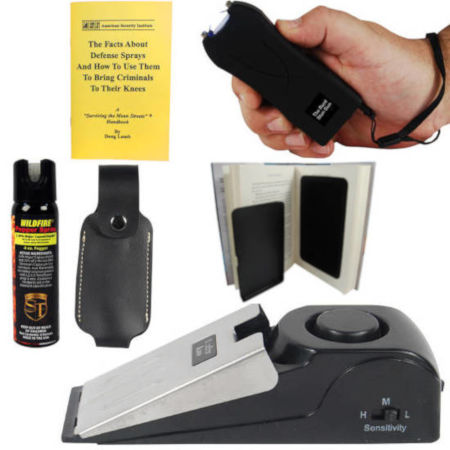College Safety Tips for Students
03/29/2024

Enjoy College Freedom with Smart Safety Habits
Key Takeaways:
- Secure your dorm with locks and alarms
- Stay safe walking at night with self-defense tools
- Navigate rideshares and parties with caution
- Protect your data with cybersecurity basics
- Prepare for emergencies with a plan and gear
Dorm & Apartment Security
Keep your living space safe with these simple steps.
- Lock doors and windows: Always secure entry points, even when inside.
- Add a door alarm: Use a portable door wedge for extra protection.
- Hide valuables: Store items in a personal safe.
Walking at Night
Stay safe on campus with these tips.
- Travel with others: Use campus escort services or walk in groups.
- Stick to lit paths: Avoid shortcuts through dark areas.
- Carry protection: Keep a personal alarm or pepper spray keychain handy.

Ride-Share & Transportation Safety
Ensure a safe trip with these precautions.
- Verify drivers: Match car details and photos in the app.
- Sit in back: Share your location with a friend for safety.
- Stay equipped: Hold a tactical pen or mini stun gun.
Party & Social Safety
Enjoy social events responsibly.
- Watch drinks: Avoid leaving beverages unattended.
- Plan exits: Arrange your own ride home.
- Trust instincts: Leave if you feel uneasy.
Self-Defense Essentials
Be ready with these tools and skills.
- Learn basics: Practice simple self-defense moves.
- Use tools: Carry pepper spray or a stun gun.
- Keep keychains: Use a self-defense keychain for quick access.
Digital & Cyber Safety
Protect your online presence.
- Secure passwords: Enable two-factor authentication.
- Avoid public Wi-Fi: Use a VPN for sensitive tasks.
- Spot scams: Ignore suspicious emails or links.
Emergency Preparedness
Be ready for unexpected situations.
- Know numbers: Memorize campus security and police contacts.
- Locate call boxes: Find them on campus for quick help.
- Pack a kit: Include a flashlight and first-aid supplies.
FAQ: Student Safety Questions
- What are the best safety items for college students? Personal alarms, pepper spray, and door locks are top choices.
- How can college students defend themselves? Learn basic moves and carry self-defense tools.
- Are these tools legal on campus? Check campus policies—most are legal off-campus but vary by state.
Stay Safe on Campus
College is about growth, not risk. Use these college safety tips to stay secure. Ready to gear up? Explore TBOTECH’s college safety products now!
Shop Now: Visit TBOTECH for free shipping over $50!
Comments
Add your comment now!
Post CommentRecent posts
-
06/27/2025Personal Safety Devices for Women
-
06/27/2025Can You Bring Pepper Spray on a Plane?
-
06/27/2025Are Butterfly Knives Illegal?


